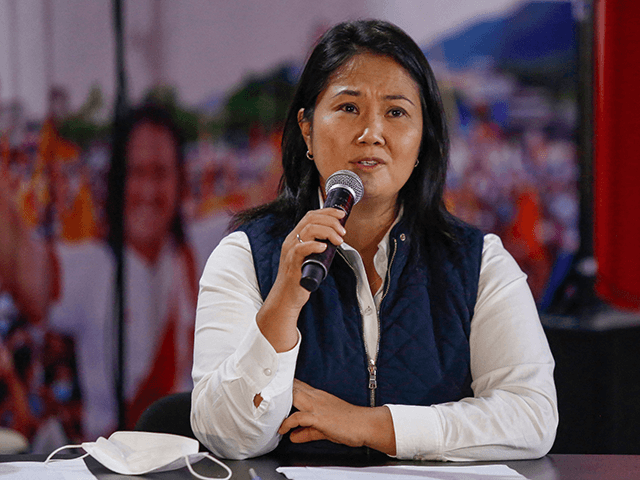Peruvians remain no closer to knowing who their next president is on Friday after a shake-up at the National Jury of Elections (JNE) caused by one of its members declaring its investigation into fraud allegations biased.
Peruvians went to the polls on June 6 to choose between three-time runoff candidate Keiko Fujimori, a hardline conservative, and Pedro Castillo, a former teacher representing the Leninist Free Peru party. Peru’s National Office of Electoral Processes (ONPE), responsible for counting the votes, completed that count shortly after the election, finding Castillo the winner with 50.125 percent of the vote compared to Fujimori’s 49.875 percent. Given the extremely close nature of the vote tally, however, Fujimori filed for an audit of several ballots, alleging her Popular Force party had found evidence of fraud.
Fujimori notably has not accused the ONPE of fraud or any improprieties, accusing Free Peru instead of planting workers at voting centers to falsify votes. Castillo has denied the allegations. Fujimori’s team is asking the JNE, which reviews fraud allegations, to remove as many as 500,000 votes from the final count due to evidence of fraud, more votes than the difference between Castillo’s and Fujimori’s totals. Due to the ongoing nature of the investigation, Castillo has yet to declare himself the winner.
The controversy shifted away from the candidates directly to the five-member JNE on Wednesday when one of its members, Luis Arce Córdova, published a letter attempting to resign. The body already had a vacancy — Arce’s departure would have left only three officials and rendered it unable to function. Arce claimed the jury was biased against Fujimori and did not want to remain on the panel so as to not add legitimacy to a process he insisted was rigged. Arce’s letter surfaced after the JNE completed its investigation of evidence in ten Fujimori appeals to nullify votes and rejected all ten.
The JNE responded to Arce with a statement noting that there exists no legal process for a JNE juror to simply resign in the middle of an active electoral investigation, rejecting his request to vacate his seat. Instead, his colleagues suspended him — a punitive measure as opposed to accepting his resignation — and have sought a replacement. Arce’s resignation will allegedly take effect immediately following the conclusion of the current investigation.
Jorge Salas, the president of the JNE, issued his own declaration condemning Arce for his comments on the alleged partiality of the body, accusing him of “attempting against the honor and good reputation of the members of the JNE, the electoral system, high authorities and servants of the nation,” according to the Argentine news agency Infobae. Salas insisted international observers have been present throughout the presidential election process and have not impugned any Peruvian electoral body.
The JNE announced on Friday, after being unable to function since Wednesday, that it had appointed Víctor Rodríguez Monteza as a temporary replacement for Arce. Peru’s El Comercio noted that Rodríguez will join the JNE with significant baggage: an investigation into potential ties to a criminal investigation — and notifying organized criminals that they were being wiretapped — and a legal disciplinary “process.” El Comercio noted, however, that Arce himself is under investigation for alleged “illicit enrichment.”
The situation mirrors that of the presidential candidates. Fujimori was arrested in 2018 on charges of taking bribes from the Brazilian contractor and corruption powerhouse Odebrecht; Castillo is under investigation for allegedly lying in his documentation to file for a presidential run, failing to disclose an executive position at a Peruvian corporation. Prosecutors attempted to request preemptive detention for Fujimori immediately following her allegations of fraud in the presidential election — claiming that she had violated the provisions of her bail by interacting with Popular Force attorneys working on the fraud probe — but a judge declined the request to arrest her again this week.
The results of the election could have radically different consequences for the country. Fujimori has been a fixture in Peruvian politics since she was a teen, taking on the role of First Lady after her father, former President Alberto Fujimori, and mother Susana Higuchi divorced (Higuchi then ran for president against the elder Fujimori). Fujimori’s Popular Force party has typically campaigned on greater investment in the police and the military to limit the threat of organized crime and drug trafficking, opening up Peru’s economy to greater foreign investment, and combating socialism.
Castillo, in contrast, is a new face in politics, shocking the country with a first-place win in the first round of the presidential elections in April. Castillo’s Free Peru party became the subject of intense condemnation after the widespread distribution in Peru of excerpts of its manifesto, which rejected the concept of freedom of the press and complimented Fidel Castro and Vladimir Lenin. Castillo’s running mate, Dina Boluarte, also alarmed voters by declaring after the first round of presidential elections that, if their ticket wins, “the comfortable Lima middle class will surely cease to be a comfortable middle class.”

COMMENTS
Please let us know if you're having issues with commenting.